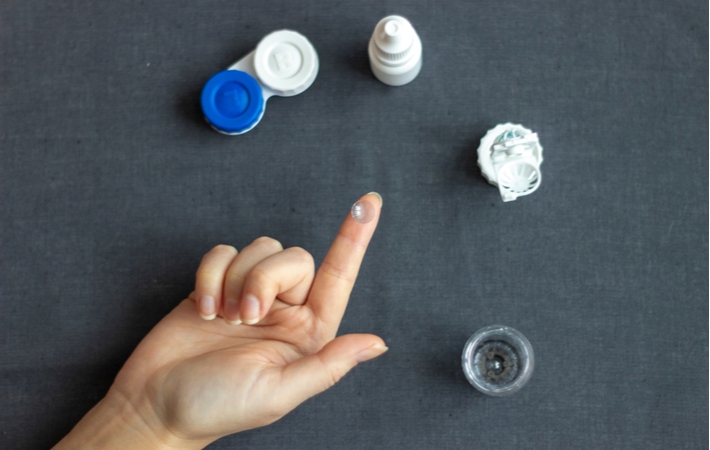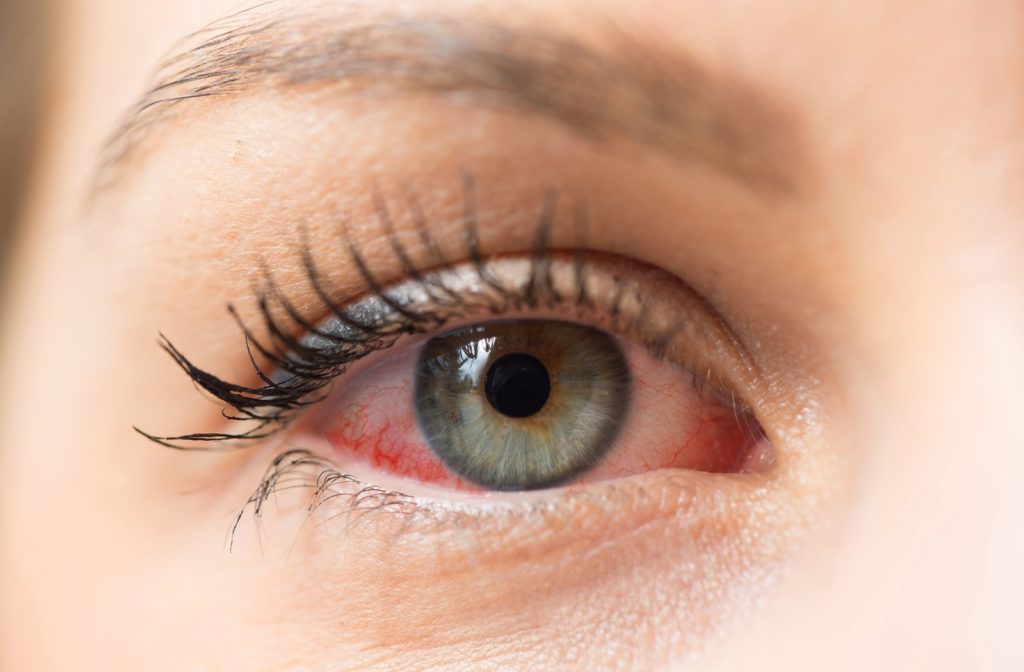Dry, irritated eyes can make it harder to focus on your everyday tasks. For contact wearers, this condition can make wearing your lenses feel impossible. Thankfully, dry eyes don’t mean you have to give up wearing your contacts; several lenses are suited for this condition.
If you experience chronic dry eyes, continue reading to learn more about this condition and some of the best contacts available for people with dry eye disease.
What Are Dry Eyes?
Dry eyes happen when your tears can’t effectively moisturize your eyes. This condition is known as dry eye disease, caused by an instability in your tear film.
Each layer of the tear film serves a purpose in keeping your eye’s surface clean and smooth. The oily layer of the tear film prevents evaporation, the watery layer fends off bacteria, and the mucus layer helps keep tears on your eye.
When issues arise in one of these layers, it can lead to irritated and inflamed eyes. Someone with dry eyes may experience several uncomfortable and annoying symptoms.
Dry Eye Symptoms
Some common dry eye disease symptoms include:
- A stinging, burning, or scratchy sensation in your eyes
- Light sensitivity
- Eye redness
- Difficulty wearing contact lenses
- Watery eyes
- Blurred vision
- Eye fatigue
- Excess mucus around the eyes
If you’re experiencing any of these symptoms, what’s causing them? What causes your eyes to become dry and irritated?
What Causes Dry Eyes?
Many people assume dry eyes are a natural part of life, but this condition’s symptoms don’t occur coincidentally. You can experience dry eyes for several reasons.
Dry eye disease typically boils down to two main causes, decreased tear production or increased tear evaporation.
Decreased Tear Production
A common cause of decreased tear production is growing older. You tend to make fewer tears as you age, but this isn’t the only factor.
Medical conditions such as lupus, Sjorgren’s syndrome, or scleroderma can lead to decreased tear production.
Another cause of fewer tears is the side effects of several medications. These different medications include antihistamines, decongestants, and antidepressants.
Increased Tear Evaporation
Increased tear evaporation is a common cause of dry eye disease. The oily layer of your tear film prevents tears from evaporating, but issues with this layer can lead to faster evaporation. Without proper moisture, your eyes can become irritated.
The oily layer of the tear film can become affected for several reasons, such as meibomian gland dysfunction and infrequent blinking. Other reasons for increased tear evaporation include:
- Wind, smoke, or dry air
- Posterior blepharitis
- Vitamin A deficiency
- Eye allergies
- Eyelid problems (ectropion & entropion)
For contact wearers, dry eyes can make wearing your contacts difficult and uncomfortable. The lenses may irritate your eyes when they’re inflamed. If you’re hoping to continue wearing contact lenses, what are the best options available?

The Best Contacts for Dry Eyes
When looking for contact lenses suited for dry eyes, you have a few possible options. Each has different benefits, so speak with your optometrist about the best option for your eyes.
Some contacts for people with dry eyes include:
Hybrid Contact Lenses
Hybrid lenses are a mixture of rigid gas permeable lenses and standard, soft contact lenses. With a rigid gas permeable center, hybrid lenses provide crisp and clear vision. A soft outer ring surrounds the center of the lens for a more comfortable fit.
Scleral Contact Lenses
Unlike regular contact lenses, scleral lenses cover your entire corneal surface. They rest on your sclera (the white of your eye), making them easier to handle with more durability. Resting on the sclera helps transform an irregular cornea into a smooth optical surface.
If you have dry eyes, scleral contact lenses can help. They provide relief by constantly moisturizing your eyes through a fluid reservoir between the cornea and the back of the lens. This consistent lubrication makes scleral lenses an effective way to treat dry eye symptoms.
Besides providing moisture, these lenses protect your eyes from smoke, wind, dust, and other irritants. Studies have found scleral lenses can increase comfort, decrease the need for eye drops, and improve visual acuity.
Orthokeratology (Ortho-K)
Orthokeratology, commonly known as ortho-k, is a type of specialty contact lens. These lenses work by temporarily reshaping the cornea while you sleep.
You can remove your lenses once you wake up in the morning and enjoy clear vision throughout the day. The effects of ortho-k will reverse when you stop wearing the lenses nightly.
You may not know it, but ortho-k can be beneficial for your dry eyes. By wearing these lenses overnight, you don’t need to rely on contacts during the day. Without a need for contact lenses during the day, your dry eye symptoms may reduce.
Speak with your optometrist before deciding on a new pair of contact lenses; they can recommend the best option for your unique needs.
Care for Your Dry Eyes
Whether it’s hybrid, ortho-k, or scleral lenses, you can experience comfort while wearing your contacts. If you’re looking for other options for dry eye relief, there are several treatments available.
If you’re experiencing symptoms of dry eye disease, or are interested in specialty contact lenses, contact the doctors at Perspective Eye Center.



